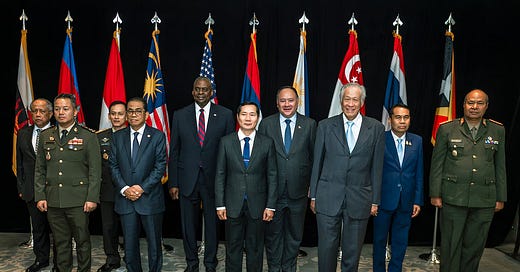NYT: America a humbler superpower in the Pacific, yet 'still indispensable'
Damien Cave, New York Times: In China’s Backyard, America Has Become a Humbler Superpower

Far from Ukraine and the Gaza Strip, as the Group of 7 wealthy democracies gathers in Italy to discuss a range of old, entrenched challenges, the nature of American power is being transformed across the region that Washington sees as crucial for the century to come: the Asia-Pacific.
Here, the United States no longer presents itself as the confident guarantor of security, a trust-us-we’ve-got-this superpower. The terrain is too vast, China’s rise too great a threat. So the United States has been offering to be something else — an eager teammate for military modernization and tech development.
…
In this new era, many countries are doing more, on their own and with U.S. help. For the first time, the United States is building nuclear-propelled submarines with Australia; involving South Korea in nuclear weapons planning; producing fighter jet engines with India; sharing maritime surveillance duties with small Pacific islands; and working with Japan on adding an offensive strike capability.
Behind the scenes, U.S. officials are also testing new secure communications systems with their partners. They’re signing deals to co-produce artillery with allies and to secure blood supplies from hospitals around the region in case of a conflict. They are also training with many more nations in more expansive ways.
These collaborations highlight how the region sees China. Many countries fear Beijing’s growing military strength and belligerence — its threats against the democratic island of Taiwan, its claim to most of the South China Sea and its land grab at the border with India. They are also less sure about China as an economic partner, with the slowing pace of its post-COVID economy and tilt away from pro-growth, pro-entrepreneur policies under Xi Jinping.
…
Pushed by other countries, the United States may finally be learning that a humbler approach can yield powerful results, said Ryan Crocker, a retired diplomat who served as U.S. ambassador to Afghanistan, Iraq, Pakistan, Syria, Kuwait and Lebanon.
“A certain degree of humility does not mean weakness,” he said. “We can’t do it all, we shouldn’t do it all. We have these relations and alliances, let’s figure out who does what.”
…
The challenge for Asia and the world, he added, is that the United States is increasingly dysfunctional and “still indispensable”: No other country does as much to protect the order that other nations and economies need.
What’s changed is that a growing number of U.S. officials now acknowledge that more assistance is needed, from more than just familiar allies. In a time of disorienting challenges — Gaza, Ukraine, China, North Korea, pandemics, climate change, artificial intelligence, nuclear weapons — their jobs now involve convincing others that humility can be as American as confidence and that it’s built into a strategy that will last, no matter who is president.
Read the full article here.




